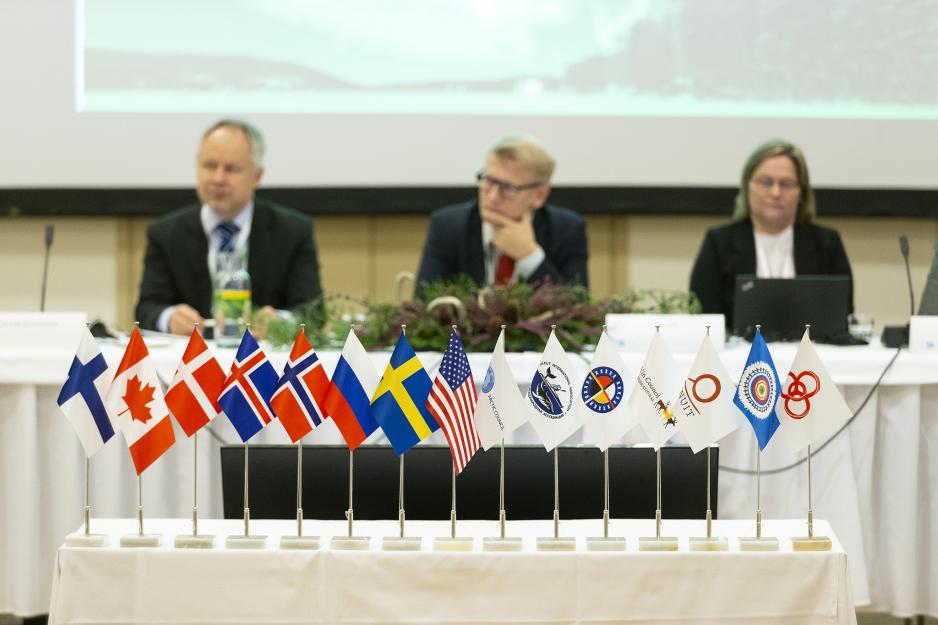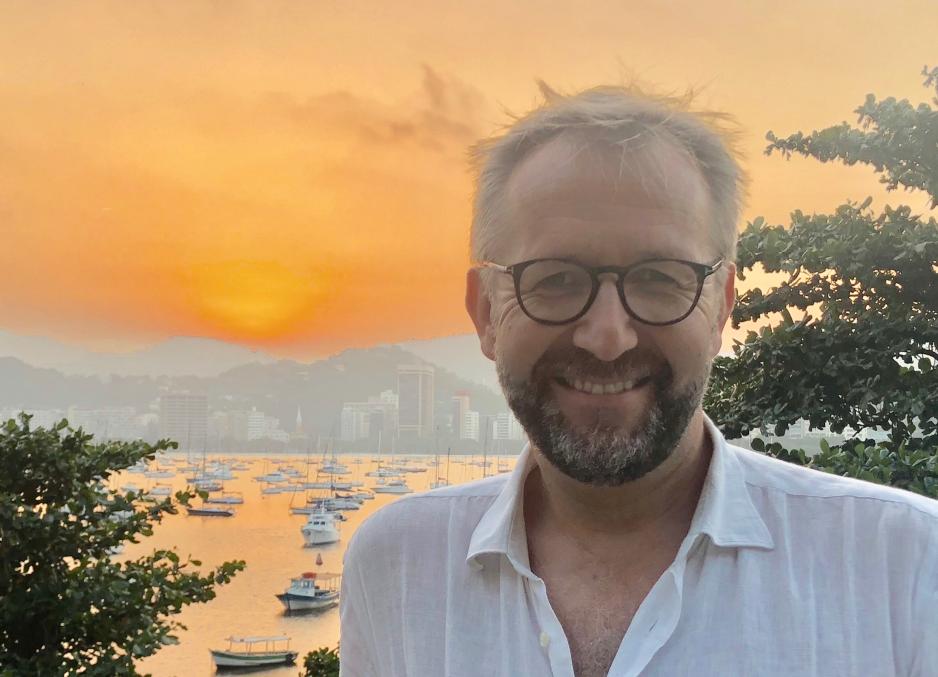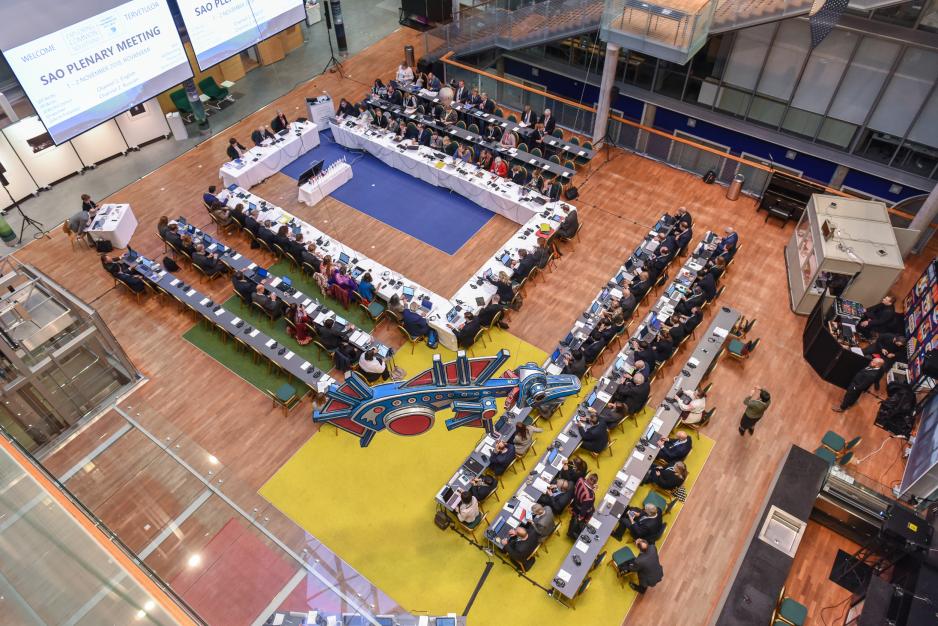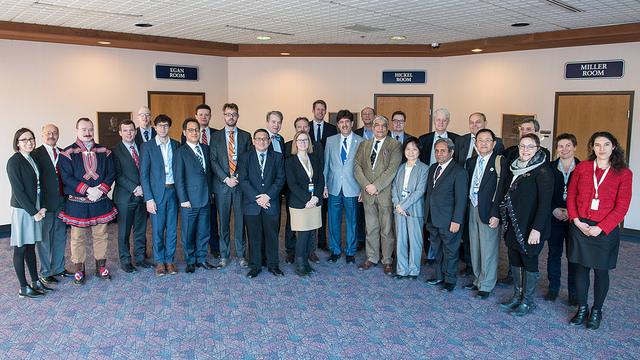The World’s Fifth Largest Country Looks North Brazil May Become The First Country From the Southern Hemisphere To Enter the Arctic

The flags representing the eight countries holding a permanent seat in the Arctic Council, as well as six indigenous peoples organisations. (Photo: Kaisa Sirén)
Brazil is considering signing the Svalbard Treaty and seeking observer status with the Arctic Council.
The Foreign Ministry in Brazil is now resuming the 2010 debate in which two specific issues were discussed: The country’s acceding the Svalbard Treaty, and whether to apply for observer status at the Arctic Council.
Stein-Gunnar Bondevik, CEO of Innovation Norway in South America, confirms this to High North News.
- It is generally acknowledged that most big nations with a bit of self-respect look to the Arctic, and that the most keen ones have placed themselves firmly in the observer chairs of the Arctic Council. However, a common feature among them is that they belong in the northern hemisphere, he says, but emphasizes:
- True, the process is in an early stage yet, however, it is nevertheless clear that the Brazilian MFA has initiated a process to consider the country’s role in the larger international Arctic cooperation.

- True, the process is in an early stage yet, however, it is nevertheless clear that the Brazilian MFA has initiated a process to consider the country’s role in the larger international Arctic cooperation, says Stein-Gunnar Bondevik, CEO of Innovation Norway in South America.
It is generally acknowledged that most big nations with a bit of self-respect look to the Arctic.
Dialogue meetings
This week, a series of dialogue meetings were held at a colloquium at the Navy Center for Political and Strategic Studies in Rio to discuss the topic.
- Saying that the Arctic is perceived as a faraway place not only for the average Brazilian, but also for several of the seminar participants, is probably true. Nevertheless there is reason to believe that several of them left the colloquium with new perspectives on the new Arctic, Bondevik says.
China expert Sergio Trinidad, a Brazilian-American with his own consultancy company in New York and thorough knowledge of Arctic dialogue through frequent attendance at e.g. the Arctic Circle conference, boiled his message down to this simple statement:
Brasil is big. That is why we need to be present in the Arctic.
The Arctic Council
- The Arctic Council is an inter-governmental organisation for cooperation on issues related to challenges faced by the Arctic states. The purpose of the organisation is to promote sustainable development with regards to environment, social conditions and economy.
- The Ottawa Declaration declares the following states as members of the Arctic Council: Canada, Denmark, Finland, Iceland, Norway, Russia, Sweden and the USA.
- In addition, there are six organizations representing Arctic indigenous people that hold status of permanent participants.
- Observer status at the Arctic Council is open to non-Arctic states, together with inter-state, inter-parliamentary, global, regional and volunteer organizations considered by the Council to be relevant to its work. Arctic Council observers primarily contribute through their engagement in the Council on working group level.
- There are currently 13 non-Arctic states approved as observers to the Arctic Council: France, Germany, Italy, Japan, the Netherlands, China, Poland, South-Korea, Singapore, Spain, Switzerland and Great Britain.
"Brazil is big. That is why we need to be present in the Arctic".
- With this understanding, he probably framed some of the essence and background for the interest in the Arctic, Bondevik explains.
Despite its considerable size, Brazil is still a reticent actor on the world arena. Even though this may continue under the country’s new leadership, which at least in its trade policy has signaled a preference for bilateral over multilateral agreements, the seminar in Rio nevertheless signals that there are forces in the country’s elite that want to see Brazil occupying more space on the international state – in more areas than football.
Focus areas
The Director of Defense and Security Issues at the Ministry of Foreign Affairs, Ambassador Alessandro W. Candeas, focused on what other major non-Arctic states do, and explained how the MFA is now resuming a dialogue about the issue after it not having been on the agenda since 2010.
According to Candeas, the following areas are of interest to Brazil:
- Climate research and general research collaboration
- Partnerships in oil and gas
- Maintaining Brazil’s interest in changes in world logistics that may come
- Technological development related to mineral exploitation, focusing in particular on subsea mineral activity.
In addition, there is Brazil’s interest in identifying values in relevant technology and management that are transferable to Antarctica, where Brazil is a treaty state.

Arctic Council Ministerial Meeting in November 2018 in Rovaniemi, Finland. The Council will meet again in May 2019. (Photo: Linnea Nordström, Arctic Council Secretariat)
Two specific issues were discussed in the process that took place in 2010; acceding the Svalbard Treaty and whether to apply for observer status at the Arctic Council. These issues are now back on the table.
- The discussions then clearly revealed that initiating formal processes if these were not supported with budgets for actual follow-up would be considered futile. This will be a key point, the Innovation Norway CEO argues.
Another indication of the importance of the Arctic
Whatever the Brazilians decide, the process itself is another indication that the Arctic holds strategic significance and that the region’s warning about climate change resonates around the globe.
It might be time for northern institutions to look to Brazil and invite partnerships.
- It is also worth noticing that the vast potential for creating value that has been documented in the High North is interesting to many and it will require a lot of international cooperation in management, Bondevik says and encourages:
- It might be time for northern institutions to look to Brazil and invite partnerships. It goes without saying that in a country of 220 million in habitants, there will be a series of excellent research and technology communities. In addition, the country has major groups of indigenous people and rules over major parts of the Amazon, with all its ensuing climate and environmental issues. The transfer value to the High North is thus significant.
He finishes by asking:
- Is the stage set for a separate Brazil seminar at the Arctic Frontiers 2019?
Skepticism
In 2012, there were also several non-Arctic states knocking on the Arctic Council door, such as China, India and Japan.
Why? The Arctic abundance in resources like oil, gas, minerals, fish and tourism.
All three were granted observer status, despite skepticism amongst some member states, during the ministerial meeting in Kiruna in 2013, when Canada took over the chairmanship of the Arctic Council.

Observers of the Arctic Council in 2017. (Photo: Linnea Nordström/Arctic Council Secretariat)
It is in particular Canada and Russia who have been reticent about expanding the Council.
Some opponents fear that the present members, in particular the indigenous people groups, will "drown" if the number of observers grows too big. Whereas others argue that if non-Arctic states are not invited to the table, they will rather knock on the door of other international bodies, such as e.g. the UN General Assembly, which might in turn reduce the influence of the Arctic Council.
A third argument is that membership fees distributed across a higher number of observers may contribute to supporting the participation of indigenous people’s groups.
Back then, Norway supported expanding the Council.
High North News has been in contact with Arctic Council, but they have not recieved an official inquiry from Brazil concerning an observary status in the Council and will therefore not comment on the matter.

